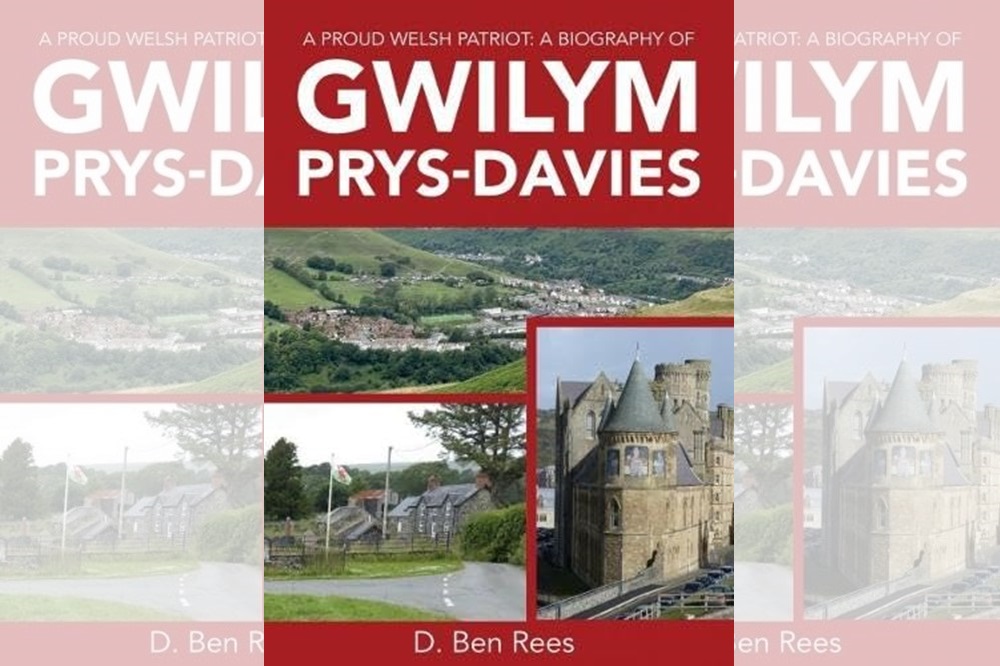Book Review: Gwilym Prys-Davies by D. Ben Rees

Jon Gower
Unlike so many of today’s limelight politicians – sloganeering, brash, showy – Gwilym Prys-Davies was someone who sat in quiet rooms and diligently got on with it. During the 1960s he helped ensure both the freedom to use and the status of the Welsh language in the courts.
He later broadened his brief, as it were, by drafting and promoting the passage of the Welsh Language Acts of 1967 and 1993.
Here was a man who had an attentive eye when it came to analysing documents, even to the point of ‘revelling in the task of reading them’ and used his probing mind to consistently and persuasively advance the causes of devolution and the promotion of the Welsh language.
Gifted politician
Lord Gwilym Prys-Davies is often best known as the Labour candidate who lost to Gwynfor Evans in the famous Carmarthen by-election of 1966 and this book imagines what might have been his political trajectory had he not suffered that defeat, going on to great things had he been given, say, a safe seat somewhere in Glamorgan.
As the former Archdruid Robyn Lewis puts it, it was one of the ‘tragedies of Wales that he did not become an M.P. and Secretary of State, perhaps moving on to the office of the first Minister of Wales.’
The late Vaughan Hughes thought Wales lost a gifted politican when Gwynfor Evans took the Carmarthen seat : ‘That was the irony – the irony of all ironies – because there is nobody alive today who devoted more of his time and energy working for the cause of self-goverment for Wales and the continuation of the Welsh language than Gwilym-Prys Davies. In beating this man, Gwynfor beat a Welsh nationalist of substance and conviction.’
Republican
A nationalist, yes and a republican too. In the 1940s Prys-Davies was the leader of a group which included the poets Harri Webb and Joyce Williams and farmer John Legonna which grew into the Welsh Republican Movement which in turn triggered a schism in Plaid Cymru.
Prys-Davies would have been the one to draw up its constitution, drawing together four strands of the nationalist task, namely promoting the idea of self-government, aiming for Welsh independence, ensuring the inclusion of non-Welsh speakers, especially in the valleys and consistently preaching Socialism.
By the end of the 1940s Gwynfor Evans decided the Welsh Republicans, firmly under the spell of Prys-Davies and described by the Liverpool Daily Post as ‘Cymric bolsheviks with beards and bombs’ should not be allowed to undermine the middle of the road position of Plaid Cymru, which led to a public parting of the ways.
Diligence
Ben Rees charts such matters with all the diligence we have come to expect from the biographer of William ‘Mabon’ Abraham, Jim Griffiths, Aneurin Bevan and Cledwyn Hughes and in this instance he was one of the first to access Prys-Davies’ private papers after they had been lodged at the National Library of Wales after his death.
It is as much an appreciation as a biography as Rees was a close friend of Gwilym Prys-Davies and thus felt his contribution needed to be put down, especially perhaps because this modest, retiring individual’s contributions were so often under the radar, made via adjustments to the wording of Acts of Parliament or having a quiet word with people of influence in order to change Wales for the better.
As he explained in his Welsh language autobiography Llafur y Blynyddoedd:
‘My hope throughout the years was that, within my lifetime, we would be able to establish an elected Assembly for Wales if we planned carefully and worked with discipline to win that prize. For me, that was one of the most important things that we could achieve. It would be a means of self-help recognising Wales and her people.’
As Rees puts it here was a man who ‘preferred to work out of the sight of television pundits and journalists, never expecting praise, always giving detailed advice and preparing one memorandum after another and drawing up addresses for Labour members who welcomed being “front runners” in the movement.’
Complexities
So this book shows us a man who saw his way through the tangled complexities of Northern Ireland, worked openly with Cymdeithas yr Iaith and with a great many other societies in Wales.
It follows his life’s journey from the village of Llanegryn, through a stint in the Royal Navy to studying law at Aberystwyth and being a special advisor to John Morris in the Welsh Office and the House of Lords.
It also chronicles his efforts to establish S4C and deal with the effects of incomers on the Welsh speaking areas, which vexed him greatly.
As Rees puts it succinctly: ‘It is impossible to write the history of the Welsh language or the saga of the Welsh Assembly or the Labour Party in Wales without mentioning his fine, brilliant contribution.’
This books lays out that contribution in painstaking detail, as Rees puts in the hours of detailed study and archival research, much as the biography’s subject had done so diligently over many a long year.
Support our Nation today
For the price of a cup of coffee a month you can help us create an independent, not-for-profit, national news service for the people of Wales, by the people of Wales.








I know nothing about this gentleman, and I will have to read this book to find out. The only thing I can say is he had little effect on the Labour party at the time. As a young lad I joined the labour party in the early 60,s and was horrified at the anti Welsh attitude throughout, with the leading members of Neal Kinnock, George Thomas, Leo Abse and many others with the betrayal of all that was important and dear to Cymru for their own personal advantage, I quickly left and joined Plaid, and remain so today.